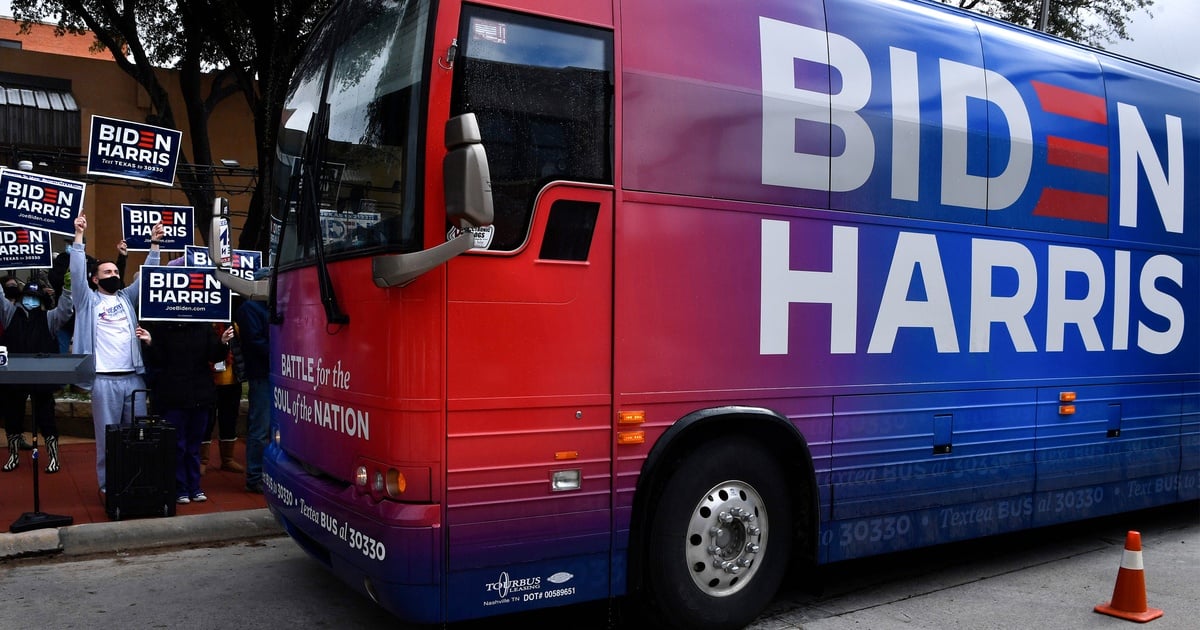Sign up for the We the Texans newsletter to receive twice-monthly updates on our year-long initiative dedicated to boosting civic engagement and chronicling how democracy is experienced in Texas.
It’s been four years since a campaign bus carrying Wendy Davis and others was nearly run off the road by a so-called “Trump Train” — a caravan of Republican activists waving giant flags showing support for Donald Trump.
Drivers of more than a dozen cars and trucks, honking and shouting, followed the bus on Interstate 35 between San Antonio and San Marcos, weaving in and out of traffic and causing a minor collision between a Biden campaign staffer following the bus and a Trump supporter.
Ultimately, the bus driver made an abrupt and speedy exit off the highway to lose the crowd.
Trump responded with enthusiastic approval: “I LOVE TEXAS!” he wrote in a tweet accompanied by a video of the incident. Democrats subsequently canceled three Biden campaign events in Central Texas due to safety concerns.
On Friday, the “Trump Train” heads to court in Austin. The trial stems from a 2021 lawsuit filed by Davis, a former state senator who became a Democratic sensation for her filibuster of an abortion restriction bill, along with the bus driver and a Biden campaign staffer. The trio sued multiple members of the caravan, alleging they violated state law and the Ku Klux Klan Act of 1871 by engaging in a conspiracy to disrupt the campaign and intimidate those on the bus.
With Trump back on the ballot, Davis and the others want to send a message that political intimidation will not go unpunished.
Davis and the two other plaintiffs — former campaign staffer David Gins and bus driver Timothy Holloway — said the members of the Trump Train attempted to prevent them from showing support for Biden.
“The violence and intimidation that our plaintiffs endured on the highway for simply supporting the candidate of their choice is an affront to the democratic values we hold dear as Americans,” said John Paredes, an attorney for the plaintiffs who works with Protect Democracy, a Washington, D.C.-based group that combats authoritarian threats to American democracy. “Our plaintiffs are bravely standing up against this injustice to ensure that the trauma they endured catalyzes positive change rather than stains our democracy.”
The defendants, who have characterized their actions on I-35 as free speech, say the lawsuit is an example of how the government can be used to silence conservative Americans.
“This is a travesty of Justice to see an administration weaponize the law against average Americans for exercising basic Constitutional rights,” Joeylynn Mesaros, one of the defendants, wrote on a website that she and her husband created to raise awareness about the lawsuit and raise money for legal fees.
Jury selection begins Friday in the civil trial, where the participants of the Trump Train could be on the hook for punitive and compensatory damages as well as attorneys fees. But if Davis and the other plaintiffs are successful, it could also bolster ways the Klan Act might be used to fight back against alleged acts of political intimidation and violence.
The Klan Act was originally passed to protect the newly-gained civil and legal rights of former slaves and prohibit the Ku Klux Klan from terrorizing and intimidating Black citizens to prevent them from voting. In recent years, it has been cited in lawsuits targeting Trump and far-right activists, including one against the organizers of the white supremecist rally, Unite the Right, in Charlottesville, Virginia. The Klan Act was also cited in suits against Trump and groups involved in the Jan. 6 attack at the U.S. Capitol, and again in a lawsuit accusing Trump of eroding trust in the 2020 election to subvert the election results. Many of those lawsuits are ongoing.
The six defendants heading to trial — two others settled their cases last year — are represented by a smattering of high-profile conservative lawyers. One is represented by Quico Canseco, a former member of Congress and Tea Party Republican. Another is represented by the Thomas More Law Center, a Christian conservative nonprofit out of Michigan. They did not respond to a request for comment.
Last week, Jason Greaves, a lawyer for the firm that has represented Trump in multiple Jan. 6 lawsuits and who represented Trump in a lawsuit to overturn the 2020 election, signed on as an attorney for two of the Trump Train defendants. Those defendants were planning to represent themselves in the trial until recently.
“Trolling is FUN”
The campaign bus for Joe Biden’s 2020 presidential campaign was on a tour across Texas when it arrived in Central Texas a few days before Election Day. A social media user tweeted “Trolling is FUN,” and called for other Trump supporters to “escort the Biden [bus] coming through San Antonio” with the hashtag #TrumpTrainTexas.
When the bus left San Antonio, Davis was on board with Gins. Another campaign staffer was following in his car.
Once they left San Antonio, dozens of vehicles with Trump and American flags surrounded the bus, shouting and honking at it, and tried to slow it down.
Videos captured “participants in the caravan driving within feet of the bus while yelling, making hand gestures, and filming, pulling out in front of the bus from the highway shoulder, and brake-checking the many-ton bus as it attempts to drive down a major highway with people inside,” court records said.
Eight months after the encounter on I-35, Davis and the others filed the lawsuit against multiple Trump supporters who were allegedly following the bus.
They argued that the Trump Train members’ driving was intentionally aggressive, motivated by their belief “that extraordinary measures were justified to ensure that Democrats were defeated in 2020,” Judge Robert Pitman wrote when he denied the defendants’ request to dismiss the case last month.
The plaintiffs also said the actions were premeditated.
“In the months and weeks leading up to the Incident, Defendants allegedly expressed support for aggressive tactics against Democrats, posting messages that supported making liberals ‘cry’ or driving into a crowd of protesters to ‘instill a little bit of fear,’” Pitman wrote.
According to court documents, Davis and the other plaintiffs said they suffered psychological and emotional injury from the event. Holloway said he was unable to drive a bus following the experience and eventually started a new business to avoid driving. Davis said she developed insomnia and still experiences anxiety at public speaking engagements. She also started hiring private security for events for the first time in her career. Gins said he developed acute anxiety and struggled to get out of bed in the morning.
The plaintiffs also filed a second lawsuit against San Marcos police, accusing law enforcement of turning a blind eye to the attack. The 911 transcripts filed in that lawsuit revealed San Marcos police refused to send help despite repeated requests from those on the bus.
Last fall, the city settled with the plaintiffs. As part of the settlement, San Marcos police officers and professional staff must receive training on responding to political violence and voter intimidation and ways to develop community trust. The city paid $175,000 to four plaintiffs, one of whom has since dropped from the case.
The defendants
The six defendants in the case are all Texas residents who were involved with other Trump Trains in the southern and central parts of the state in 2020, according to court documents. They were identified via photos and videos on social media that showed their vehicles present at the time of the incident.
Stephen and Randi Ceh were leaders of a local Trump Train group in which they organized caravans of supporters to meet up and travel around the area, including the day the Biden bus traveled through Central Texas. Randi Ceh is accused of acting as “mission control,” on the day of the incident, alerting participants of the bus’ whereabouts. Her husband, Stephen, was in close contact with his wife and their adult daughter, Hannah, who was following the bus. Hannah Ceh and her husband, Kyle Kruger, were also named in the suit. They settled their case last year. The terms were not made public, but they issued public apologies for their involvement.
Greaves, who is representing the Cehs, said in a statement that the couple looks forward “to complete vindication on the merits for exercising their God-given, and First Amendment-protected right to free expression.” Earlier this year, Steve Ceh — a pastor and chaplain for the Comal County Republican Party — started holding Trump Train rallies again with the New Braunfels Trump Train.
Another defendant, Eliazar Cisneros, who confirmed he was present at the incident, has participated in other Trump Trains and went to Washington D.C. on Jan. 6, 2021 where “he coordinated with others to bring collapsible batons and bear mace to allegedly protect others from Antifa and Black Lives Matter,” according to court records. Cisneros also reportedly drove his truck into a Black Lives Matter protest in 2020; he was not charged.
Ahead of the Trump Train incident, Cisneros posted a photo of a gun which he called his “Antifa meat tenderizer,” according to court records. He also texted Joeylynn Mesaros, another defendant, asking her to make a t-shirt for him that says, “don’t make me Rittenhouse your ass,” referencing Kyle Rittenhouse, the Illinois man who fatally shot two men during a protest in Wisconsin. Rittenhouse was acquitted of multiple felony charges during his high-profile trial in which he argued he acted in self-defense.
The remaining defendants are Dolores Park and Joeylynn and Stephen Mesaros.
Video and photos show Park following the Biden bus, including a photo of herself in the “Trump Train” captioned “[t]here I go . . . escorting the Biden bus out of town.”
Video footage also shows the Meseros’ truck waiting on the shoulder of the highway for the bus and then “dangerously and abruptly cutting right in front of it,” the original complaint states. The Mesaros’ said in their website that they refused to settle the case, spending more than $500,000 on legal fees. They said they did nothing wrong but show their support for Trump while they drove alongside the Biden bus.
Pitman, the Obama-appointed federal judge overseeing the case, has denied multiple requests by the defendants to dismiss the lawsuit. Most recently, he denied a request to dismiss the lawsuit by some of the defendants who argued there is not enough evidence for a jury to convict.
In that ruling, he said there was ample evidence for a jury to convict the Trump supporters and he sided with Davis and the other plaintiffs’ interpretation of the Klan Act, agreeing that it “establishes an independent substantive right to engage in support or advocacy in federal elections that extends beyond the act of voting.”
Last year, two of the Trump supporters in the case petitioned the Fifth Circuit Court of Appeals to intervene and dismiss the case. While the court declined to do so, at least one judge suggested the plaintiffs’ interpretation of the Klan act was overly broad.
Voting FAQ: 2024 Elections
-
When is the next election? What dates do I need to know?
-
What’s on the ballot for the general election?
-
How do I make sure I’m registered to vote?
-
How do I register to vote if I haven’t?
-
What can I do if I have questions about voting?
- Read more
As The Texas Tribune’s signature event of the year, The Texas Tribune Festival brings Texans closer to politics, policy and the day’s news from Texas and beyond. Browse on-demand recordings and catch up on the biggest headlines from Festival events at the Tribune’s Festival news page.



